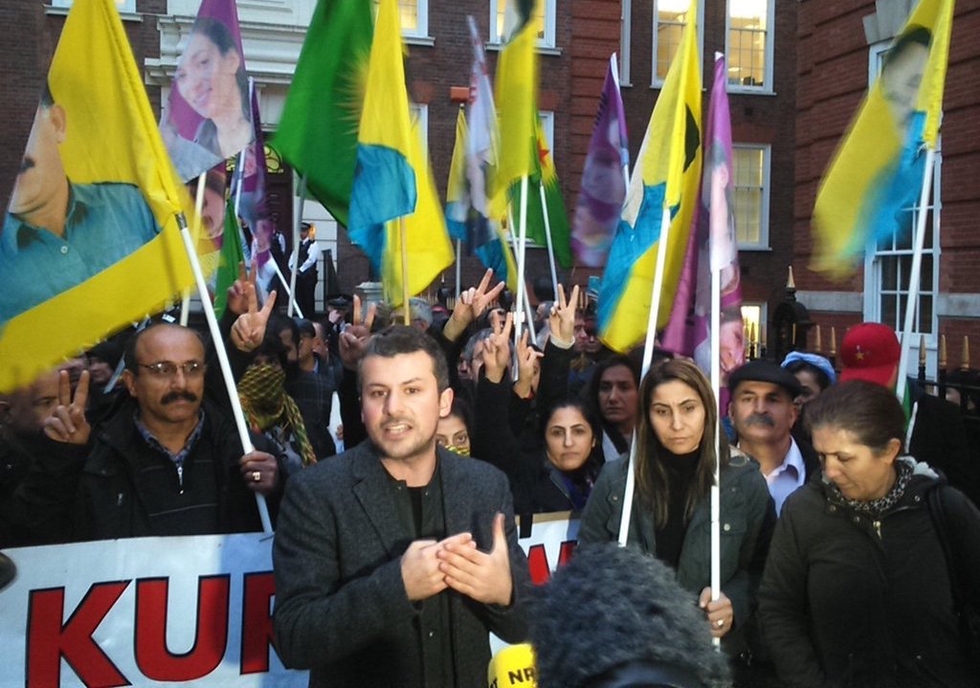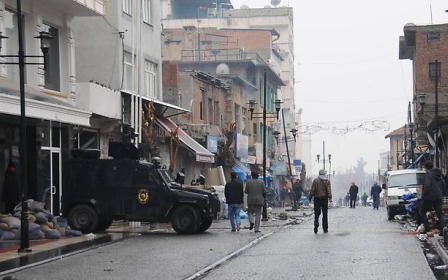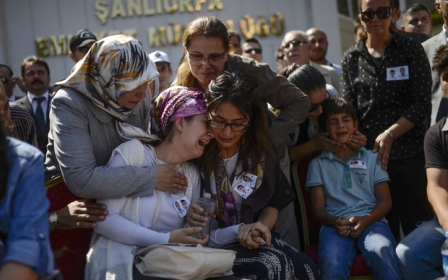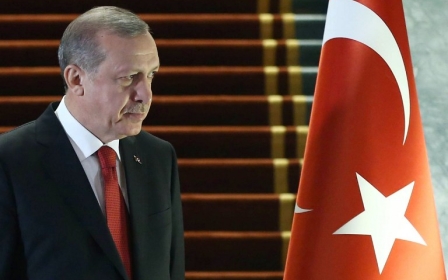Pro-Kurdish demonstrators occupy Conservative party HQ in London

Pro-Kurdish activists occupied the headquarters of the UK Conservative party on Tuesday in protest of what they say is the government's failure to condemn Turkish military action against Kurds.
As many as 50 people barricaded themselves inside the building near Parliament Square in central London, holding a large banner reading "Kurds want recognition of their rights" and chanting that Turkey was a "terrorist" state.
Memed Aksoy, a British-Kurdish activist who took part in the occupation, told Middle East Eye that the action was designed to draw attention to the actions of the Justice and Development party (AKP) government in Turkey.
“We’re here to demand that the Conservative party break their silence on what is happening in Turkey, on the Turkish state’s policies against the Kurdish people, the sieges laid on Kurdish towns and the killing of innocent civilians," he said.
According to the UK Foreign Office, Turkey is the UK's 10th largest European export market and by the end of 2014 bilateral trade between the two countries had risen by 68.8% since 2009. The UK is also one of the countries in Europe that supports Turkey's accession to the European Union.
Aksoy cited the extensive relationship between the two countries as a potential means of putting pressure on Turkey.
“If Turkey doesn’t change its actions, they can go further and say that’ll they’ll apply sanctions, just like Russia did," he said. "When Turkey shot down the Russian jet, Russia imposed sanctions on Turkey and Turkey is feeling the force of that.”
Clashes between Kurdish, and leftist, militants and the Turkish security services in the southeast have left hundreds dead since the collapse of a two-year ceasefire in July.
Four civilians were killed by Turkish security services in Silopi on Tuesday. According to the Firat News Agency (ANF), which is linked to the Kurdistan Workers Party (PKK), the bodies of four slain civilians have been brought to Silopi State Hospital following "heavy and random fire on civilian settlements for hours" by Turkish security forces in the Karsiyaka neighbourhood.
Among them is alleged to be Seve Demir, an assembly member of the Democratic Regions Party (DBP).
A report by the Turkish Human Rights Association released on Tuesday claimed that around 25 women had been killed during clashes since the summer. Among those were Zeynep Taskın and her mother-in-law, Masallah Edin who were reportedly killed by police snipers in Cizre in September.
A mother of three was also killed on Sunday when a mortar shell hit her apartment in the Sur district of Diyarbakir, which has been under curfew since early December.
The Turkish government says that over 3,100 PKK operatives have been killed during both air strikes on the group's headquarters in Iraq's Qandil mountains and in operations in Turkey's southeast.
The PKK heavily disputes this figure, however, saying that around 220 guerilla fighters had been killed, along with scores of civilians.
The war between the PKK and the Turkish state officially began in 1984 and since then over 40,000 people are thought to have been killed, with human rights abuses reported on both sides.
The Turkish military carried out multiple clearences of villages in southeast Turkey over several decades leading to hundreds of thousands of refugee, many of whom fled to Europe.
One occupier, Turkan Olkan, originally fled Turkey as a refugee 30 years ago due to the mounting violence and "pressure by the Turkish government on Kurdish people" at a time when even speaking Kurdish in public was a prosecutable offence in the country.
"I started businesses here, I brought up two boys here, they both graduated in sociology, but they’re both interested in their origins, where they come from," she told MEE.
“But you don’t need to be Kurdish to be concerned about what’s going on in Kurdistan, about civilian lives."
'Autonomy'
The Turkish government has repeatedly reaffirmed that it is fighting "terrorism" in southeast Turkey, saying that over 200 members of the security services have been killed since July by PKK-linked organisations.
Numerous senior figures in the pro-Kurdish People's Democracy Party (HDP) and DBP have been arrested or threatened with arrest, with the government alleging that the parties are PKK front groups.
On Tuesday, Selahattin Demirtas, co-chair of the HDP, called for the immunity of all Turkish parliamentarians to be lifted, following calls for his own immunity to be lifted and beginning of a criminal probe.
“Our proposal for the constitution is already there," he said in a press conference, in parliament. "You could lift the immunity of all of us in one day. We will vote ‘yes.’ Lawmaker’s immunity should not exist beyond immunity within parliament.
“We are not worried about the lifting of immunities," he added. "We are only complaining about injustice and inequality."
Last week, Turkish President Recep Tayyip Erdogan blasted Demirtas over the politician's calls for "autonomy" within Turkey.
"How dare you talk about establishing a state in the southeast and in the east within Turkey's existing unitary structure," Erdogan told reporters at Istanbul airport.
"You cannot take such a step. Neither the national will, nor our security forces, armed forces, police, village guards allow such a thing."
New MEE newsletter: Jerusalem Dispatch
Sign up to get the latest insights and analysis on Israel-Palestine, alongside Turkey Unpacked and other MEE newsletters
Middle East Eye delivers independent and unrivalled coverage and analysis of the Middle East, North Africa and beyond. To learn more about republishing this content and the associated fees, please fill out this form. More about MEE can be found here.




